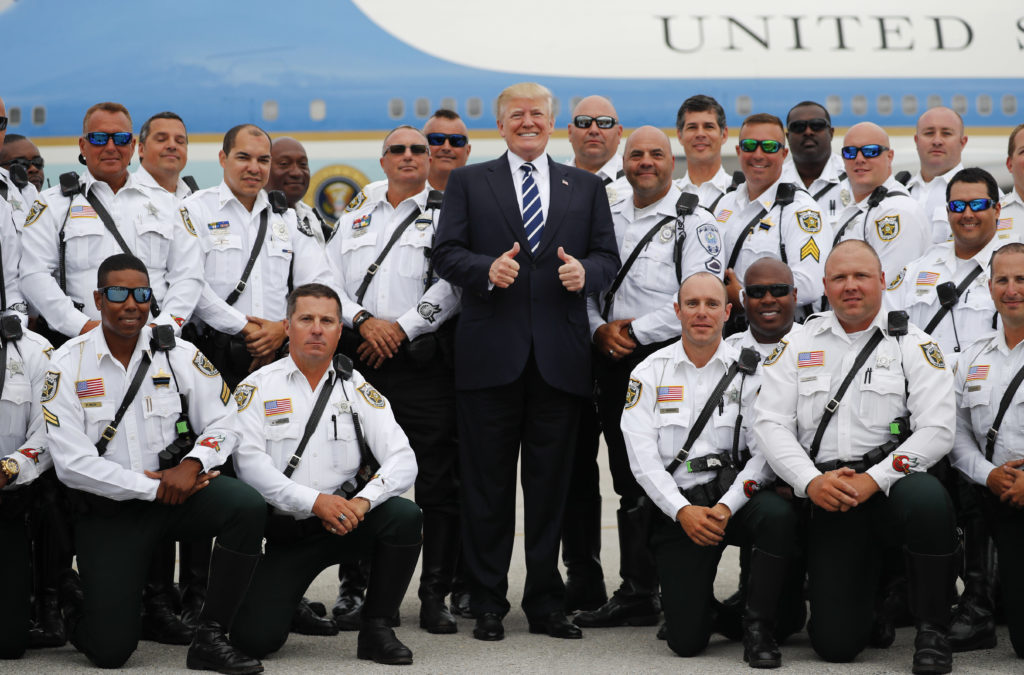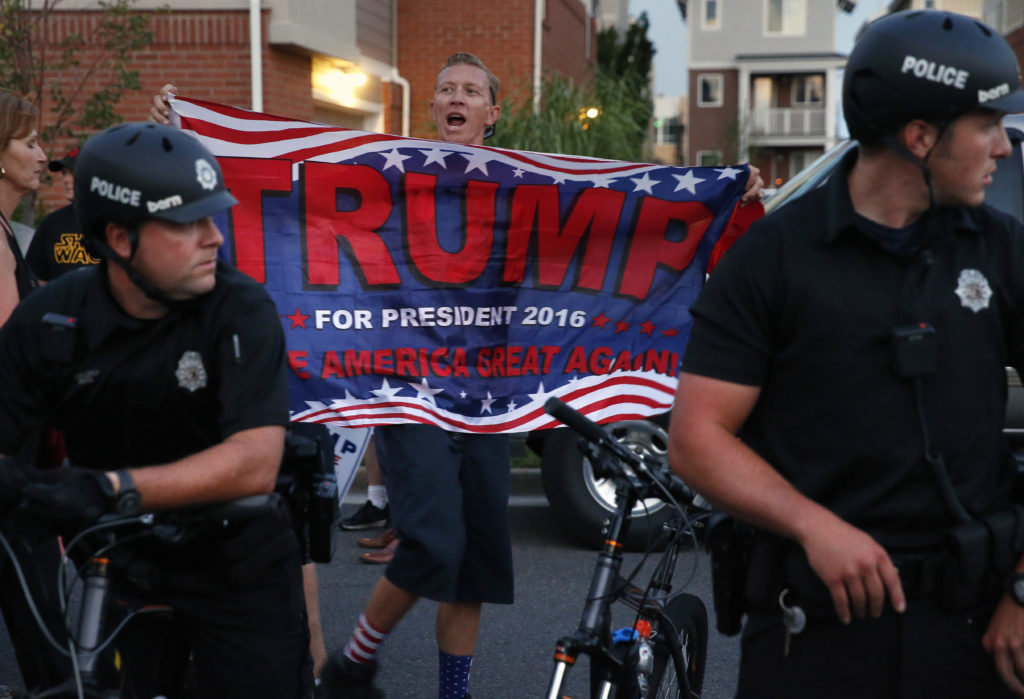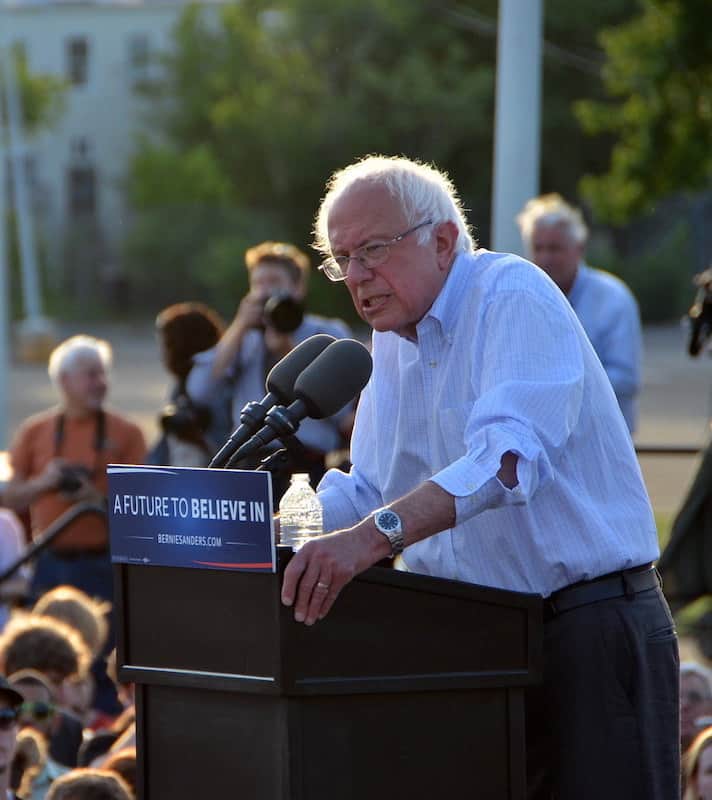 We have several friends who are police officers, and some of them insisted on voting for Trump in the last election. They
We have several friends who are police officers, and some of them insisted on voting for Trump in the last election. Theysaid "Republicans support the police." - Well, I think they've learned differently since 2016.
WHY? It's Democrats who vote consistently to arm the police with vests, training, guns and equipment.
WHY NOT REPUBLICANS? - Not only do they CUT Police funds but the man they voted for in 2016 doesn't and hasn't paid them for his many rallies across the country.
So if you're a police officer and you vote for a Republican- You are voting against your profession.
Here's the story
In the News: Why the Trump campaign won’t pay police bills
Introduction
“Do we love law enforcement or what?” President Donald Trump asked a cheering crowd during his “Make America Great Again” political rally Oct. 12 in Lebanon, Ohio.
“Thank you, law enforcement!” the president later told officers, who he called “heroes.”
But when Lebanon City Hall sent Trump’s campaign a $16,191 invoice for police and other public safety costs associated with his event, Trump didn’t respond. Trump’s campaign likewise ignored Lebanon officials’ follow-up reminders to cover the sum — one rich enough to fund the entire police force for nearly two days in this modest city of 21,000, between Dayton and Cincinnati. The bill remains unpaid.
“There’s a lot of benefit when a president comes here: economic benefits, more visibility for our community,” Lebanon Mayor Amy Brewer said. “But I would hope and believe the Trump campaign would pay its bills. It’s our taxpayer dollars.”
The red ink Trump poured on Lebanon’s thin blue line is no anomaly.Some invoices are three years old. In all, city governments say Trump’s campaign owes them at least $841,219.
Must Trump pay?
That depends on who you ask. The cities are adamant Trump should pay up. But in many of these cases, there are no signed contracts between the municipal governments and the Trump campaign. The cities dispatched police officers to secure Trump’s events because they believe public safety required it — and the U.S. Secret Service asked for it.
Reached for comment, Trump campaign Director of Operations Sean Dollman referred questions to the campaign’s communications staff, which did not respond to numerous requests.
The Fraternal Order of Police, which endorsed Trump in 2016, has no formal position on whether presidential campaigns should pay municipalities’ bills for police protection, said Chuck Canterbury, the organization’s president. “That is the government’s responsibility in each local area,” he said.
But presidential candidates should consider paying cities’ police bills even if they don’t believe they are legally required to do so, other police advocates said.
“The fiscal impact on local governments, especially during campaign seasons in critical vote states or communities, can be significant,” said Richard Myers, executive director of the Major Cities Chiefs Association and former police chief for several cities, including Colorado Springs, Colorado, and Newport News, Virginia. “When one considers how much money campaigns raise and spend, it does not seem unreasonable to expect some degree of reimbursement for such demands for service.”
‘A character integrity issue’
Five municipal public safety bills — from Green Bay and Eau Claire, Wisconsin; Tucson, Arizona; Burlington, Vermont and Spokane, Washington — date back to 2016, before Trump became president.
“It is our hope that [Trump’s campaign] will do right by the taxpayers of Mesa and provide payment,” Mesa Deputy City Manager Scott Butler said.
“Let’s be honest, when does Trump ever pay his bills?” Spokane City Councilmember Kate Burke asked — an allusion to Trump’s many unresolved deals and disputes from his decades in business.
“I’m hopeful they’ll pay. I’m hopeful they’ll do what’s right. People that don’t pay their bills — that’s a character integrity issue,” El Paso Mayor Dee Margo told the Center for Public Integrity.
But municipal policies vary.Many of the more than 60 cities Trump visited since his inauguration for Make America Great Again rallies have policies against billing any politician for police costs. Several more cities calculated the cost of providing public safety services for Trump rallies but said they chose not to bill Trump’s campaign.
*********************************************************************************************************
 | ||||||||||
| Source: Center for Public Integrity interviews with municipal officials, municipal records and statements | ||||||||||
***************************************************************************************************
Trump’s July 2017 rally in Youngstown, Ohio, for example, involved paying 48 police officers more than $11,147 in overtime, although Youngstown officials didn’t invoice Trump.
Local governments do have some financial leverage when presidential candidates want to stage a rally not at a private venue, but a government-owned facility — such as a municipal convention center or city park.
Several have required the Trump campaign to sign a contract or similar agreement to pay various expenses and fees at their municipal facilities, including police protection.
In Nashville, for example, the Trump campaign agreed to pay $49 per hour for each uniformed police officer patrolling Nashville’s Municipal Auditorium during a rally in March 2017 and $50 per hour for a rally in May 2018.
The Trump campaign has honored these city facility contracts, although in at least once case, not in a timely fashion, and in another case, not in full.
The Gallatin Airport Authority in Montana, which administers the Bozeman Yellowstone International Airport where Trump‘s campaign rallied on Nov. 3, 2018, sent the Trump campaign a $17,355 invoice for labor, construction and rental costs. Trump paid three months after its due date, on April 1, 2019, according to a canceled Trump campaign check.
In 2016, then-Trump campaign manager Corey Lewandowski signed a contract for a rally with the city-owned Tucson Convention Center, but Trump’s campaign has yet to pay for the public safety costs still in dispute.
*************************************************************
Trump’s campaign “was, in fact, frustrated by the refusal of Tucson Police to do anything to control the violent and angry protestors outside the Convention Center,” McGahn wrote in a letter to Tucson’s city attorney — an accusation Tucson officials denied.
Through the course of his many Make America Great Again rallies, Trump has been adamant about his support and respect for police.
“We love you and will always support you,” Trump tweeted in January on National Law Enforcement Appreciation Day.
“For you guys, anything I can do I’ll do,” he told the International Association of Chiefs of Police last year at their annual convention.
“America’s police officers have earned the everlasting gratitude of our nation,” Trump said in October.
Trump’s campaign certainly has the money to pay cities’ police bills: it reported nearly $40.8 million cash on hand, as of March 31, according to federal records. 
Police payment catch-22?
Cities hosting presidential candidates say securing many presidential candidate rallies, such as those conducted by most 2020 Democratic candidates, is a matter of overall community safety. Many are relatively modest affairs that don’t carry excessive cost.Trump rallies are an entirely different matter.
When Trump visits a city to stage a “Make America Great Again” rally, often cash-strapped city governments have little choice but to provide whatever public safety resources the U.S. Secret Service requests of them.
The requirements are often significant — street closures, security perimeters, the paid time of dozens of law enforcement officers — because unlike most official presidential visits, political rallies attract thousands, if not tens of thousands of people.
The president’s campaign political events have also earned a reputation for rowdiness, even violence. Protestors have thrown and received punches, journalists have been threatened — even Trump himself has been targeted.
Researchers at the University of Pennsylvania concluded that cities hosting Trump rallies during the 2016 presidential campaign on average experienced 2.3 more assaults than they would expect on a typical day — an increase not associated with his opponent Hillary Clinton’s campaign rallies during the same time period.

Why? Blame Congress.
The Secret Service, spokesman Jeffrey Adams said, is not funded to reimburse local police, “and we don’t have a mechanism to do so.”
Local officials are therefore left to bill presidential campaigns in the hope they’ll pay because it’s their ethical or moral duty. While a few cities have flirted with suing presidential candidates for nonpayment, they’ve concluded legal action would be more aggravation than it’s worth.
Some presidential candidates do pay, as the Center for Public Integrity noted in a 2017 report on presidential candidates and police bills.
For example, Sen. Ted Cruz, R-Texas, meticulously paid police bills during his run for president in 2016, with then-spokeswoman Catherine Frazier explaining that Cruz put a “a high value on running an organized campaign.” Clinton’s 2016 presidential campaign appears to have paid most bills, although federal records provide no evidence that the Clinton campaign ever paid one known bill from Philadelphia.
President Barack Obama’s campaign committee did not always pay municipal police bills when local governments wanted, and in at least one reported case, ignored a large bill, arguing that it wasn’t responsible for the costs. Obama’s campaign committee officially shut down in July 2018 without reporting any remaining debt. Federal records do indicate that Obama’s campaign paid some local government entities — from the City of Hollywood, Florida, to the Pittsburgh Bureau of Police — for “security” costs over the years.
Others never pay. Numerous city officials told the Center for Public Integrity that, over the years, they’ve billed both Democratic and Republican candidates for police costs only to be ignored.
So why don’t cash-strapped city governments protest by denying candidates such as Trump police protection?
Trump rallies draw big crowds, for one: Revelers fill hotels, pack restaurants, purchase sundries and drink watering holes dry. Then there’s the unquantifiable luster that comes with a commander in chief visiting town.
There are also a darker reasons not to keep cops away from campaign events, particularly ones involving the commander in chief.
“Most [police] chiefs will remind their officials how long it took Dallas to not be known as the place where the president was assassinated,” said Myers of the Major Cities Chiefs Association.
What about the Democrats?
Among 2020 Democratic presidential candidates, Sen. Bernie Sanders has the most checkered history when it comes to paying cities’ police bills.During his 2016 presidential run, Sanders’ campaign at one point refused to pay campaign event-related public safety bills from 23 different local governments and law enforcement agencies.Total tab: more than $449,000.
Sanders’ then-campaign attorney Brad Deutsch explained the campaign’s refusal to pay in a September 2016 letter to the city attorney of Tucson, Arizona, where Sanders had conducted a campaign event in March 2016.

“The Campaign did not contract for, not did it request or arrange for the Tucson Police Department to provide public safety at the Campaign event,” Deutsch wrote. “The level of security or public safety requirements anticipated for any particular event were not dictated by the campaign.”
Sanders spokeswoman Arianna Jones told the Center for Public Integrity in October 2017 that the campaign would work with municipal government to “amicably resolve these matters” even if the campaign wasn’t “legally responsible” for event security costs.
It made its final payment — more than $22,000 to the Solano County Sheriff’s Office in California — on Sept. 15, 2018.
Now, as Sanders is running second or third behind former Vice President Joe Biden in most major Democratic presidential primary polls, Sanders’ current presidential campaign won’t say whether it would pay all public safety bills it received from local governments.
“We pay all costs for police support we ask for or agree to as a condition of the permit at a particular venue,” Sanders spokeswoman Sarah Ford said.
Reached by phone, Daniel McCarthy, Biden’s chief operations officer and chief financial officer, declined to comment, and Biden press officials didn’t respond to several requests for comment. (Prior to announcing his presidential run, Biden personally campaigned in November for Sen. Heidi Heitkamp, D-N.D., and Heitkamp’s campaign paid a City of Fargo police bill associated with the event, city spokesman Gregg Schildberger confirmed.)
Several other Democratic presidential campaigns also didn’t respond to multiple inquiries, including that of Sen. Kirsten Gillibrand of New York, whose 2018 U.S. Senate campaign described her as “always supporting law enforcement.”
But like O’Rourke’s campaign paying its police bill in El Paso, a few Democratic candidates have already spent precious campaign dollars on police bills, municipal records indicate. Others — including Sen. Elizabeth Warren, D-Mass., who’s rising in recent polls — tell the Center for Public Integrity that they’ll definitely pay if municipal governments send them public safety bills.
Take Sen. Cory Booker of New Jersey. His presidential committee racked up $50,400 in fees — mostly police overtime — associated with his campaign kickoff rally April 13 in Newark, New Jersey, where Booker used to serve as mayor.
Booker’s campaign paid the bill on May 2, according to a deposit document from Newark’s Revenue Collection Division.
“Cory 2020 believes we should always pay the bills for police or public safety expenses,” Booker spokeswoman Sabrina Singh said, adding that it’s “wrong that the Trump campaign has not paid bills for his MAGA rallies. The campaign should pay these bills immediately.”
Sen. Kamala Harris, D-Calif., received a public safety expense invoice for $187,327.87 following her massive campaign kickoff rally — an estimated 20,000 people attended — on Jan. 27 in Oakland, California. The invoice due date: April 13. As of this week, the Harris campaign had paid Oakland $65,000, with a remaining balance of $122,327.87 due by next week, Oakland city government spokeswoman Karen Boyd confirmed.
Two city leaders running for president — Mayor Pete Buttigieg of South Bend, Indiana, and Mayor Wayne Messam of Miramar, Florida — also vowed that their campaigns would pay whatever police bills their campaigns receive.
Said Buttigieg spokesman Chris Meagher: “As a mayor, Pete knows that local government makes things work, and it’s important that they get reimbursed for the work done to keep the public safe.”
Potential legal trouble
Regardless of whether presidential campaigns believe they should pay public safety bills that city governments send them, federal election law states this much: “A political committee shall report a disputed debt … if the creditor has provided something of value to the political committee.”In its mandatory campaign finance reports filed with the Federal Election Commission, Trump’s campaign committee has not reported debts to municipal governments or police departments. Nor has it disclosed the debts in federal filings as “disputed debts” — something the Sanders 2016 presidential campaign did while initially refusing to pay its police bills.
Several election law lawyers asserted that Trump’s campaign is therefore likely violating federal campaign finance laws.
“It’s hard to argue that public safety services to the campaign is not something of value to the political committee,” said Erin Chlopak, director of campaign finance strategy for the nonpartisan Campaign Legal Center and former FEC assistant general counsel.
The bipartisan FEC, whose four remaining commissioners often deadlock on high-profile political issues, could conceivably itself investigate Trump’s campaign if it believed the campaign wasn’t properly disclosing disputed debts. A third party could file a complaint against the Trump campaign with the FEC, forcing the issue.Furthermore, a campaign committee may consider requesting an advisory opinion from the commission “for activities or scenarios for which there is not clear legal guidance,” FEC spokeswoman Judith Ingram said.
Congress could also involve itself. House Democrats in particular have deluged Trump and his administration with various oversight requests.
“The American taxpayers deserve to know to what extent they are subsidizing the president’s political activities.”Rep. Zoe Lofgren, D-Calif., chairwoman of the Committee on House Administration
“It’s outrageous that the president is leaving local municipal governments to foot the bill for his excessive political campaign events,” said Rep. Zoe Lofgren, D-Calif., chairwoman of the Committee on House Administration. “The American taxpayers deserve to know to what extent they are subsidizing the president’s political activities.”
In the meantime, presidential campaign rallies — and the police presence surrounding them — are all but destined to be larger and more frequent ahead of the nation’s first presidential caucus in Iowa and primary in New Hampshire.Trump, who officially filed for re-election on the day of his inauguration, is scheduled to next week conduct what could be one of his biggest political rallies yet. It’s slated to serve as a ceremonial campaign kick-off extravaganza at the Amway Center — stated capacity of 18,500 — in Orlando, Florida.
And, according to the Orlando Sentinel, the city is requiring Trump’s campaign to pay up front.
The moral of the story for cities who want presidential candidates to help pay for their visits?
“Treat the political committee just like you would any private sector event promoter,” said Brett Kappel, a government affairs and public policy partner at the Akerman LLP law firm. “Get it in writing.”
